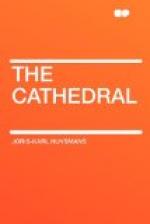“They were ill-starred, one as a saint and the other as a poet,” Durtal concluded, as he drew back to get a better view of the front.
It was indeed incredible, with the chasing of silvery flowers wrought on the panes by frost; with its church-drapery, its lace rochets, its fine pierced work, as light as gossamer, running up to the level of the second storey, and forming a fretted frame for the great stone-carvings of the porch. And above that it rose in hermit-like sobriety, unadorned, Cyclopean, with the colossal eye of its dull rose-window between the two towers, one full of windows and richly wrought like the doorway, the other as bare as the facade above the porch.
But after all, what absorbed and possessed Durtal’s mind was still those statues of queens.
He finally thought no more of the rest, listened to nothing but the divine eloquence of their lean slenderness, regarding them only under the semblance of tall flower-stems deep in carved stone tubes and expanding into faces of ingenuous fragrance, of innocent perfume, while Christ, touched and saddened, blessing the world, seemed to bend from His throne above them to inhale the delicate aroma that rose from these up-soaring chalices full of soul. Durtal was wondering—what potent necromancer could evoke the spirits of these royal doorkeepers, compel them to speak, and enable us to overhear the colloquy they perhaps hold when in the evening they seem to withdraw behind the curtain of shadow?
What have they to say to each other—they who have seen Saint Bernard, Saint Louis, Saint Ferdinand, Saint Fulbert, Saint Yves, Blanche of Castille—so many of the Elect walking past on their way into the starry gloom of the nave? Did they cause the death of their companions, the five other statues that have vanished for ever from the little assembly? Do they listen, through the closed doors, to the wailing breath of heart-broken psalms, and the roaring tide of the organ? Can they hear the inane exclamations of the tourists who laugh to see them so stiff and so lengthy? Do they, as many saints have done, smell the fetor of sin, the foul reek of evil in the souls that pass by them? Why, then, who would dare to look at them?
And still Durtal looked at them, for he could not tear himself away; they held him fast by the undying fascination of their mystery; in short, he concluded, they are supra-terrestrial under the semblance of humanity. They have no bodies; it is the soul alone that dwells in the wrought sheath of their raiment; they are in perfect harmony with the cathedral, which, divesting itself of its stones, soars in ecstatic flight above the earth.
The crowning achievement of mystical architecture and statuary are here, at Chartres; the most rapturous, the most superhuman art which ever flourished in the flat plains of La Beauce.




